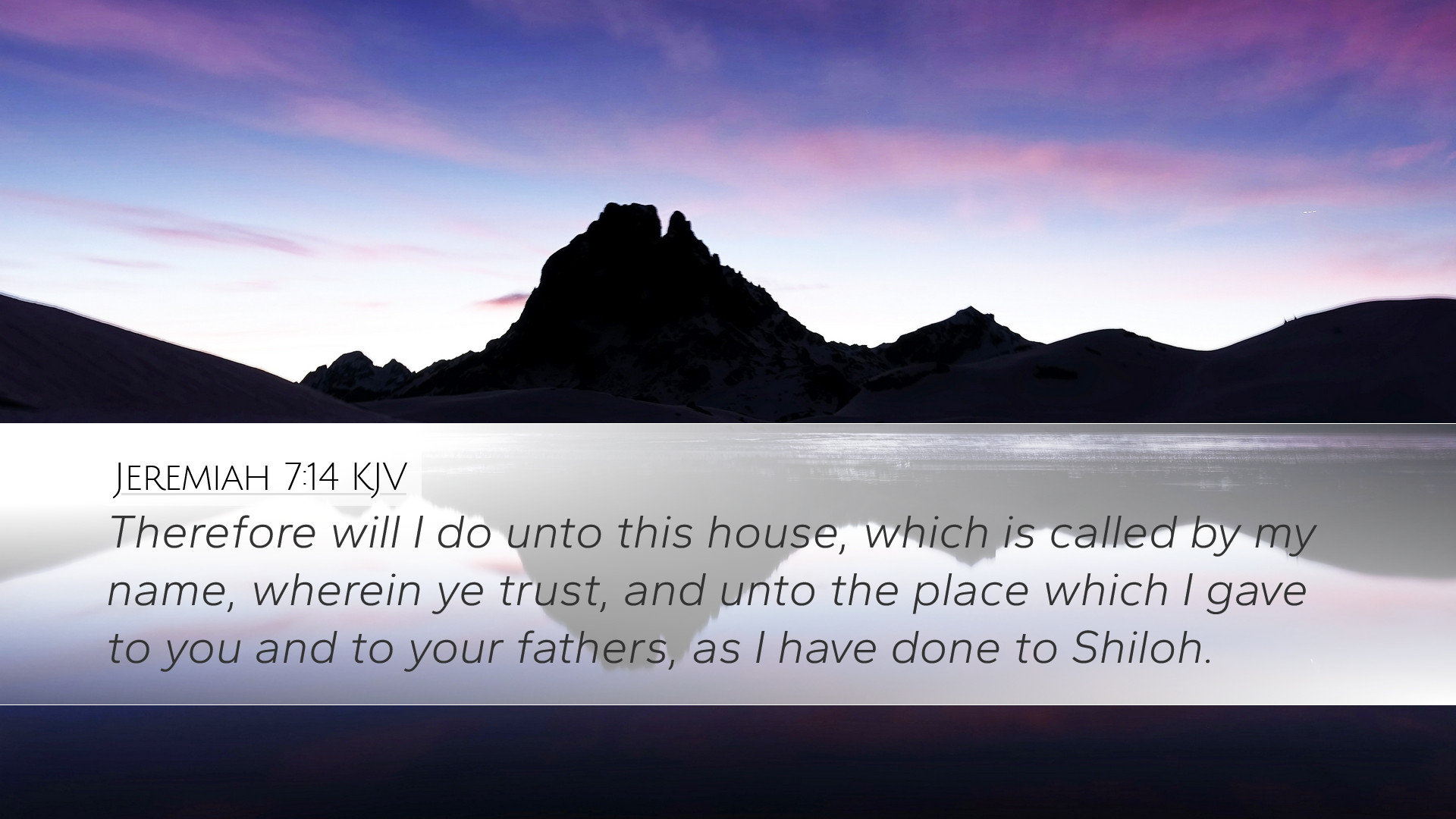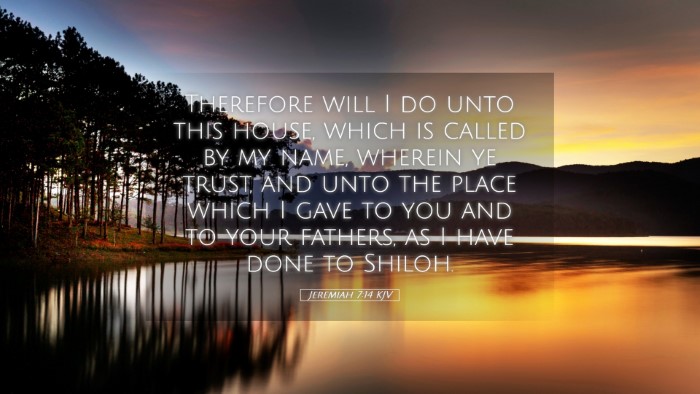Commentary on Jeremiah 7:14
Verse: "Therefore will I do unto this house, which is called by my name, wherein ye trust, and unto the place which I gave to you and to your fathers, as I have done to Shiloh."
Introduction
The verse Jeremiah 7:14 serves as a solemn warning from the prophet, underscoring the consequences of disobedience and the false sense of security that the people felt due to their association with the temple. This commentary will explore insights from various public domain commentators, providing deep reflections and applications for theologians, pastors, and scholars.
Contextual Background
Jeremiah stands as one of the major prophets of the Old Testament, delivering messages of judgment and hope to a wayward Israel. Chapter 7, where this verse is located, is often referred to as “The Temple Sermon.” Jeremiah addresses the people’s misplaced trust in the temple as a sanctuary and shield against divine judgment without heartfelt repentance and a genuine return to covenant faithfulness.
Exegesis of Jeremiah 7:14
The verse demonstrates God’s intention to allow judgment upon Judah, symbolically identifying the temple as a falsely held refuge. The reference to Shiloh, where the original tabernacle resided and was eventually destroyed, illustrates that God’s presence is not tied to a location but to the faithfulness of the people.
Insights from Matthew Henry
Matthew Henry emphasizes that the divine judgment depicted in this verse serves as both a warning and a call to repentance. He argues that the people had a false confidence in their heritage and rituals while neglecting the true essence of worship and obedience to God. Henry poignantly notes:
“The temple of the Lord, the temple of the Lord, are these; but without faith, the temple is to no purpose.”
This highlights the futility of relying solely on external religious symbols if the heart is not oriented towards God.
Insights from Albert Barnes
Albert Barnes, in his commentary, identifies the theological implications of God’s actions. He notes that God's removal of His presence from the temple was a significant act of judgment. Barnes states that Shiloh serves as a forewarning to the people of Judah:
“The destruction of Shiloh is a historical proof that God can and will remove His presence from places associated with His worship when His people are unfaithful.”
Here, Barnes focuses on the theme of accountability and the necessity of aligning one’s life with true worship, rather than ritualistic observance.
Insights from Adam Clarke
Adam Clarke brings attention to the sociocultural dynamics of Judah’s religious life during Jeremiah’s time. He points out that the people’s reliance on the temple as a sacred refuge came from a fundamental misunderstanding of God’s intentions. Clarke writes:
“The temple was not an amulet against divine wrath; it was a place designated for worship, contingent upon the adherence to God’s covenant.”
Clarke’s insight reminds readers that God’s mercy and presence are conditional and must be met with authenticity and integrity in spiritual life.
Theological Implications
The passage invites readers to consider the nature of God’s judgment and mercy. The use of Shiloh as a precedent illustrates that God’s favor does not guarantee protection against judgment, particularly when the people stray from their covenantal responsibilities.
- True Worship versus Ritualism: The notion that worship must stem from a transformed heart rather than mere ritual is central to understanding this text. The act of worship without faithful living is hollow.
- Historical Lessons: Shiloh serves as a critical reminder of God’s sovereignty in history. The destruction of sacred places is not an arbitrary act but rather a consistent theme wherein God acts when His holiness is at stake.
- Call to Authenticity: The call for authenticity rings loud through the centuries. Modern readers and congregants are reminded that external symbols must align with internal truths.
Applications for Today
As we reflect on Jeremiah 7:14, several practical applications surface for contemporary believers and leaders:
- Self-Examination: Encouraging congregants to engage in self-examination regarding their faith practices and the authenticity of their relationship with God.
- Community Accountability: Fostering a community where accountability is prioritized, and leaders model and teach a faith that reflects the character of God.
- Teaching on God’s Holiness: Pastors should emphasize the importance of God’s holiness and what it means for worship, ensuring that congregants understand that true worship is transformative.
Conclusion
Jeremiah 7:14 serves as a significant text that calls for serious reflection on the nature of God's relationship with His people. Through the insights from Matthew Henry, Albert Barnes, and Adam Clarke, it becomes clear that God desires sincerity over superficiality. Understanding this verse not only sheds light on historical realities but also offers timeless truths applicable across generations. The warning of judgment levied against Judah persists as an imperative reminder for all to seek genuine connection with the Divine, keeping in mind that external forms of worship must be complemented by an authentic inner life.


